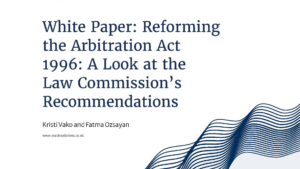Marriage breakdown: The Law in Northern Ireland
Have you got a question?
For parents involved in arranging child maintenance often lead to arguments resulting in children being caught in the middle as their parents argue as to: who should care for them, how often the non-resident parent should see them or what school they should go to?
The legislation in this jurisdiction in respect of children is enshrined in the Children Order (Northern Ireland) 1995 which states as its main principle that the welfare of the child is the paramount consideration for the court in reaching decisions in that the court supply a welfare checklist and are required to have particular regard to:
- The ascertainable wishes and feelings of the child concerned (considered in the light of his age and understanding);
- His physical, emotional and educational needs;
- The likely effect on him of any change in his circumstances;
- His age, sex, background and any characteristics of his which the court considers relevant;
- Any harm which he has suffered or is at risk of suffering;
- How capable of meeting his needs is each of his parents and any other person in relation to whom the court considers the question to be relevant;
- The range of powers available to the court under this Order in the proceedings in question.
Generally, the starting point for the courts is determining what the best interests of the child are that this is protected by ensuring that the child retains links with both parents.
In general, mothers automatically have parental responsibility for their child from birth.
Fathers usually have parental responsibility for the child if they were married to the child’s mother and/or are listed on the child’s birth certificate.
If both partners have parental responsibility, then both are responsible for the child’s wellbeing until he or she reaches adulthood at age 18.
If however there is parental disagreement in issues concerning the children the principle orders that a court can make are contained in Article 6-8 of the Children Order which is as follows:
Residence Orders – This Order determines where a child will live and with whom and can also be reflected by way of a joint Residence Order; in other words a shared care arrangement between the parties after the application.
Contact Orders – The court can make a Contact Order where there is a disagreement between the person that the child is living with and the qualifying non-resident applicant, usually a non-resident parent or another family member such as a Grandparent, about seeing the subject child. The court can make an order requiring the person whom the child is living with to allow the child to visit or stay with the non-resident applicant.
Parental Responsibility Orders – This conveys “all the rights, duties, powers, responsibilities and authorities which by law a parent of the child has in relation to the child…”
Specific Issue Orders – This is an Order, which resolves disputes in particular areas of Parental Responsibility, such as determining which school a child should go to.
For parents involved in arranging child maintenance, below are some of the key words you’ll come across together with their meaning.
Child Maintenance
For child maintenance purposes, a child is anyone under 16 or someone aged between 16 and 20 who:
- Is not married or in a civil partnership
- Wasn’t ever married or in a civil partnership
- Is in full-time non-advanced education
If Child Benefit is still being received, someone under 20 can still be regarded as a child for child maintenance purposes even if they aren’t in full-time non-advanced education.
The County Court and the High Court deal with divorces and dissolutions of civil partnerships.
The spouse or civil partner who makes the application is the ‘petitioner’. They can act on their own behalf or ask a solicitor for advice. People representing themselves can get advice from our solicitors.
Grounds for divorce or dissolution of a civil partnership
A divorce petition must be grounded on one of the reasons below:
- Two years’ separation with the consent of the other spouse to divorce
- Five years’ separation
- Unreasonable behaviour
- Adultery
- Desertion
A dissolution of civil partnership must be due to one of the reasons below:
- Two years’ separation with the consent of the other partner to dissolve the partnership
- Five years’ separation
- Unreasonable behaviour
- Desertion
If you require any advice in respect of the above issues, our solicitors may advise and help you.
Alessio, with the Marketing team, strives to help colleagues excel with client care, while also keeping the firm ‘on the pulse’ regarding the most critical...
-
Aviation House, 125 Kingsway
London WC2B NH
United Kingdom
- (+44) 020-3051-5060
Book a call back
Share this article
Got a question?
Please complete this form to send an enquiry. Your message will be sent to one member of our team.
Related posts

Judgment in Lipton v BA Cityflyer Ltd (10 July 2024)
Today the UK Supreme Court handed down its decision in Lipton v BA Cityflyer, long awaited after almost 5 years of litigation, unanimously

Reforming the Arbitration Act 1996: A Look at the Law Commission’s Recommendations
Have you got a question? Enquire Now Kristi Vako and Fatma Ozsayan have looked at the new recommendations published by the Law Commission.

Navigating the Confluence of Technology, Management, ESG, and DEI Trends for Law Firms
Even before the world of work changed with the onslaught of the global COVID-19 pandemic, the legal landscape was undergoing an unprecedented transformation.

The UK National Security and Investment Act 2021
The National Security and Investment Act 2021 (the Act) came into force on 04 January 2022. The Act creates a new screening regime



